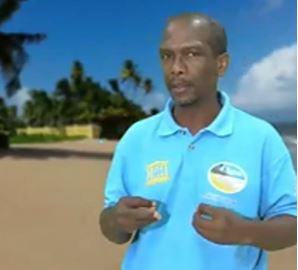UNESCO: Sandwatch programme promotes resilient coastal ecosystems in Caribbean SIDS. (Jan 17-19th, 2022)
To foster resilient coastal ecosystems, the National Commissions for UNESCO of St. Maarten, Curaçao and St. Lucia organised a Sandwatch Capacity Building workshop for UNESCO National Coordinators and ASP School Network Coordinators in the Caribbean SIDS from 17 to 19 January 2022. This three-day regional workshop targeted interested participants from government, academia, and ASP network coordinators to learn more about the Sandwatch programme and discuss how it can be revitalised in the Caribbean islands.
The Small Island Developing States (SIDS) in the Caribbean are highly dependent on marine and coastal resources. The region is home to 10% of the world’s coral reefs, extensive coastal mangrove ecosystems and rich biodiversity. 70% of the population lives on the coasts, and Caribbean beaches are often the main source of income for the tourism-dependent region. Consequently, the region’s economy and its prospects for sustainable development are inextricably linked to a healthy and thriving marine and coastal environment.
Sandwatch promotes participatory citizen science and quality education by bringing together students, teachers and local communities to work together on the ground to monitor and conserve the coastal and marine environment. Through this approach, it contributes to climate change and ocean hazards adaptation by building the resilience of ecosystems and communities.
It is precisely the purpose of Sandwatch to monitor these environmental changes in the Caribbean islands, to analyse the data and information collected and to share the related results and insights. Because in order to better protect people and the environment, we need to better understand them and further disseminate our knowledge through a shared culture of science - Saadia Sanchez-Vegas, Director and Representative of the UNESCO Cluster Office for the Caribbean
Jean-Paul Ngome Abiaga and Massimiliano Lombardo, Programme Specialists for Natural Sciences at the UNESCO Cluster Office for the Caribbean, presented the Sandwatch manual, several videos and best practices, as well as step-by-step instructions for successful implementation of the programme. Mr Ngome Abiaga shared experiences of implementing Sandwatch in the Indian and Pacific Oceans. The three country examples underlined the need to involve local communities, recommended the establishment of a Sandwatch committee at country level and regional cooperation, and more.
The Small Island Developing States (SIDS) in the Caribbean are highly dependent on marine and coastal resources. The region is home to 10% of the world’s coral reefs, extensive coastal mangrove ecosystems and rich biodiversity. 70% of the population lives on the coasts, and Caribbean beaches are often the main source of income for the tourism-dependent region. Consequently, the region’s economy and its prospects for sustainable development are inextricably linked to a healthy and thriving marine and coastal environment.
Sandwatch promotes participatory citizen science and quality education by bringing together students, teachers and local communities to work together on the ground to monitor and conserve the coastal and marine environment. Through this approach, it contributes to climate change and ocean hazards adaptation by building the resilience of ecosystems and communities.
It is precisely the purpose of Sandwatch to monitor these environmental changes in the Caribbean islands, to analyse the data and information collected and to share the related results and insights. Because in order to better protect people and the environment, we need to better understand them and further disseminate our knowledge through a shared culture of science - Saadia Sanchez-Vegas, Director and Representative of the UNESCO Cluster Office for the Caribbean
Jean-Paul Ngome Abiaga and Massimiliano Lombardo, Programme Specialists for Natural Sciences at the UNESCO Cluster Office for the Caribbean, presented the Sandwatch manual, several videos and best practices, as well as step-by-step instructions for successful implementation of the programme. Mr Ngome Abiaga shared experiences of implementing Sandwatch in the Indian and Pacific Oceans. The three country examples underlined the need to involve local communities, recommended the establishment of a Sandwatch committee at country level and regional cooperation, and more.

Andy Paul (left), Sandwatch trainer, took the participants virtually to the beach and gave insights into the training. He introduced the Sandwatch method Monitoring, Analysing, Sharing, Taking Action (M.A.S.T.) and prepared practical examples for observing and analysing the coastal environment, e.g. sand structure, beach vegetation, waves and currents.
During the capacity building, the added value of Sandwatch for scientific policy advice on climate change adaptation was also discussed. By directly and actively engaging schools, universities and local communities in collective action, Sandwatch can help protect and support people, including more women and girls, and their countries’ natural environments, creating a better quality of life while preserving important natural capital such as Caribbean beaches. Sandwatch also is viewed as a practical contribution to the ongoing decades being implemented from 2021 to 2030, namely the United Nations Decade on Ecosystem Restoration, and the United Nations Decade of Ocean Science for Sustainable Development.
The workshop was chaired by the Secretaries General of the three National UNESCO Commissions, Marva C. Browne, Marcellia Henry and Marcia Symphorien.
During the capacity building, the added value of Sandwatch for scientific policy advice on climate change adaptation was also discussed. By directly and actively engaging schools, universities and local communities in collective action, Sandwatch can help protect and support people, including more women and girls, and their countries’ natural environments, creating a better quality of life while preserving important natural capital such as Caribbean beaches. Sandwatch also is viewed as a practical contribution to the ongoing decades being implemented from 2021 to 2030, namely the United Nations Decade on Ecosystem Restoration, and the United Nations Decade of Ocean Science for Sustainable Development.
The workshop was chaired by the Secretaries General of the three National UNESCO Commissions, Marva C. Browne, Marcellia Henry and Marcia Symphorien.